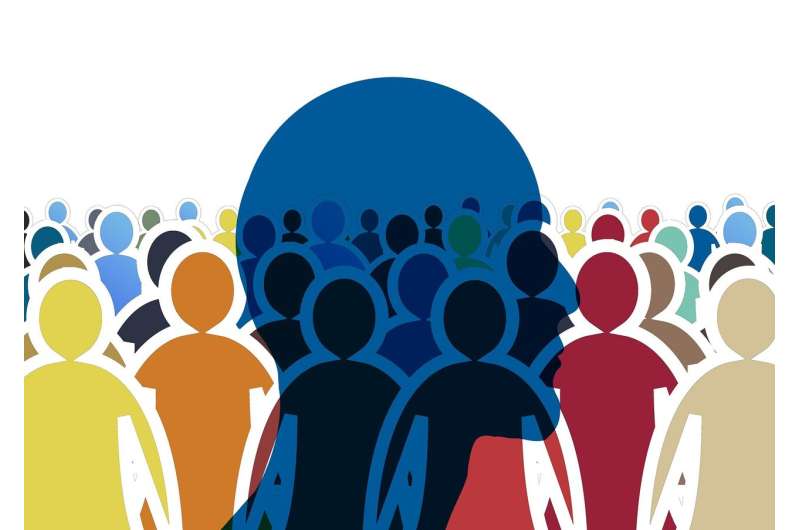This article has been reviewed according to Science X's editorial process and policies. Editors have highlighted the following attributes while ensuring the content's credibility:
fact-checked
trusted source
proofread
New book addresses a largely ignored problem: Social anxiety

We all have some social anxiety. The nervousness we might feel before giving a speech is one example. Some people, however, have more social anxiety than others, and limit their social engagement due to excessive chronic fears of being embarrassed or humiliated. Although such social anxiety is common in both adolescents and adults, it is rarely diagnosed and treated.
In a new book titled "Social Anxiety: Hidden Fears and Shame in Teens and Adults," Thomas E. Brown, a clinical professor of psychiatry and neuroscience at the University of California, Riverside's School of Medicine, explains how social anxiety can limit friendships and lead to loneliness and depression. The book, written with a colleague and just released by the American Psychiatric Association Publishing, offers 22 case vignettes that highlight 11 adults and 11 teens who have various types of social anxiety as well as related conditions, such as attention-deficit/hyperactivity disorder (ADHD), depression, or autism.
"Social anxiety is a persistent part of many people's thinking about how other people would think about them," Brown said. "It's like what would my mother, father, spouse, best friend, pastor, or other people in the community think about me if they knew particular things that I have done or if they knew what I'm thinking about or wishing to be able to do. Sometimes it has to do with specific fears about information that might be disclosed. Sometimes it's worrying about what my parents would have thought about my actions if they were still alive and could know about them."
According to available data in 2012 in the United States, the lifetime prevalence of social anxiety for those between the ages of 13 and 17 years was 11% for females and 6% for males. The lifetime prevalence for American adults between the ages of 18 and 64 years was 11% for females and 14% for males.
"Social anxiety disorder is all too often not recognized by physicians, psychologists, and other mental health practitioners," Brown said. "Currently, there are a few people talking and writing about it. But there simply has not been a whole lot of empirical research about it. Further, many people do not ever disclose the problems they have with social anxiety to other people, including their therapists."
Brown explained that according to the Diagnostic and Statistical Manual of Mental Disorders, a handbook that serves as a guide for U.S. and other health care professionals for diagnosing mental disorders, social anxiety impacts people negatively in a variety of ways: increased rates of school dropout, increased unemployment, lower socio-economic status, and increased likelihood of remaining single or becoming divorced.
"Despite these difficulties, only about half the people with social anxiety ever seek treatment for it," Brown said. "Many people are embarrassed about having such fears. Typically, those who seek treatment for social anxiety do so only after 15 or 20 years of experiencing their symptoms. Some social anxiety is inherited. It can run in families. It can also be learned in a family that is excessively protective."
Brown added that adolescent girls who develop breasts much earlier than their peers are often self-conscious and worry about what people are going to think about them. For adolescent boys, it is more a matter of height as well as when they must undress in a locker room.
"Such anxiety often gets in the way of dating and romantic relationships," he said. "For example, socially anxious college kids report fewer interactions with the opposite sex. Some people have a lot of anxiety about their sexual performance. They think, 'Am I able to get my sexual partner turned on? Am I attractive to them?'"
According to Brown, fears linked to social anxiety are usually unfounded.
"There are some people who are just very fearful and quick to get nervous in any situation where there's at least a bit of ambiguity," he said. "Psychotherapy, interventions and prescribed medications are some ways to mitigate social anxiety."
An expert on ADHD, Brown grew up in Chicago. He got his undergraduate education at Knox College in Illinois and his doctoral degree at Yale University. He was invited to join the clinical faculty at Yale Medical School, where for 20 years he taught and saw patients. After his wife died in 2014, he moved to California three years later to open his own clinic and be near his adult children and grandchildren. He was appointed clinical professor in the Department of Psychiatry and Neuroscience at UCR in February 2022.
Brown has published seven books on various aspects of ADHD, many translated into foreign languages. Written for a lay audience, "Social Anxiety: Hidden Fears and Shame in Teens and Adults" is his first book on social anxiety.
"I hope readers of this book and their family members and friends who are struggling with social anxiety will understand that they can get help right away rather than wait 15 or 20 years before seeking help as many people do," he said.
More information: www.perlego.com/book/4466458/s … teens-and-adults-pdf


















